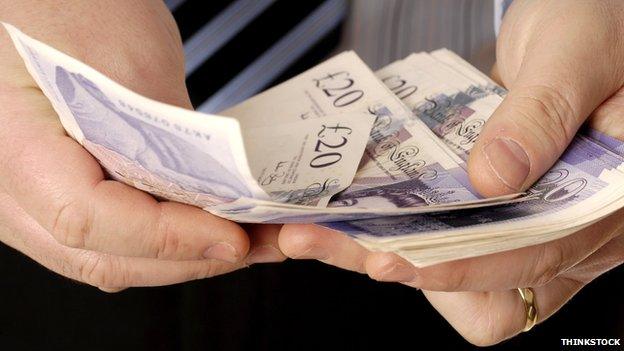How generous is the minimum wage increase?
- Published
- comments

For those of us fortunate enough to earn considerably more than the national minimum wage, a 3% rise to £6.70, external may sound pretty derisory.
It is equivalent, for example, to just two and half flat-white coffees in a famous coffee chain, and would allow the recipient of that wage to rent a one-bedroom place in a dowdier part of London, so long as he or she didn't eat, use power, pay council tax or wear clothes.
Not big bucks.
But when David Cameron and Nick Clegg say it is the "largest real-terms increase" since 2008, they are not simply making a point about how badly low-paid workers have done (pre tax and benefits) since then.
Because what has been happening to inflation - its fall to a low of 0.3% in January - makes the 3% increase better than a poke in the eye.
The more important point perhaps is that the price of essential goods - those all of us have to buy, whether we like it or not - has been falling sharply.
So in January the price of food and non-alcoholic drinks dropped at an annual rate of 2.5%, which is the lowest since the beginning of 1997 (when the relevant data was first collected).
The cost of transport fell at an annual rate of 2.8%, reflecting the collapse in the oil price, which was again a record low.
There was a modest monthly fall in gas and electricity prices, but a handsome 3.7% month-on-month drop in the price of clothes and shoes.
So unless inflation were suddenly to let rip between now and October 2015, which is when the new minimum wage is introduced, the 3% increment should be worth at least 3% in real terms, when adjusted for the inflation - or in this case the deflation - that applies to the goods which those with least resources spend most of their money on.
With an important exception of course - there is still inflation of 3.3% in cigarettes and booze - though this too has been falling (from 5% in December).
And although the Bank of England expects inflation to bump along near 0% for most of this year, it does expect prices to start rising again very gently come the autumn, when the pay rise is actually handed over.
Also there is of course one really important area of the living costs of all of us, including the poorest, where inflation remains excessive, namely the cost of a home.
So many would argue that if any British government really wanted to address poverty and the most grotesque forms of inequality, much more would need to be done to increase the supply of affordable housing.